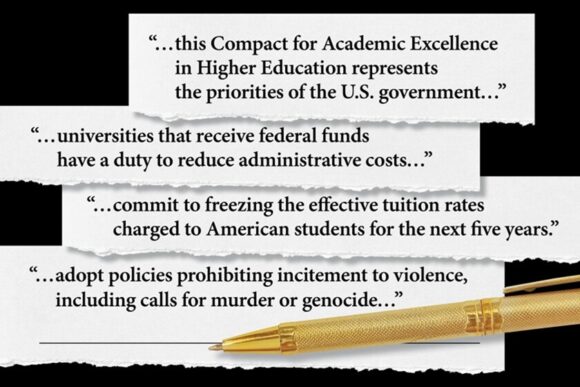Dear Commons Community,
H. Holden Thorp, editor at Science, has an editorial this morning entitled, “Higher education fails at collective action.” It describes the inability of major colleges and universities to unite to fight Trump’s policies and compacts designed to reduce academic freedom and scientific merit. Below is the entire editorial.
Read it and weep!
Tony
——————————————————————————————-
Science
H. Holden Thorp – “Higher education fails at collective action”
October 24, 2025
In the latest development in the ongoing combat between universities in the United States and the Trump administration, the Department of Education has presented them with what it calls a “compact.” In exchange for preferential tax benefits and access to federal dollars for research, the schools are expected to make various changes involving the costs of undergraduate education, standards of admission, free speech on campus, and the content of courses that are mostly outside the sciences. The provisions have little to do with how research is conducted, and many are so at odds with the principles of academic freedom and scientific merit that one might expect all universities to reject them out of hand. But with a few notable exceptions so far, that is not what is happening. By exploiting the divisions that exist in the US higher education system and its persistent inability to act collectively, the administration is pushing forward with its strategy of divide and conquer.
The first nine universities that received the “Compact for Academic Excellence in Higher Education” included red state public institutions where most of the stated principles are already in place or are being pushed by state legislatures. The University of Texas jumped in immediately to support the ideas. Vanderbilt University has been very outspoken in the past about its embrace of free speech but has demurred on replying to the compact. Initially, only the Massachusetts Institute of Technology rejected the agreement, but a few others have since said no as well. After the compact was offered to all institutions, legislators in Iowa called for their universities to sign on.
Over the past several years, many universities adopted institutional neutrality on public issues, whether geopolitical or domestic, unrelated to higher education. But even that has led to disagreements that the Trump administration is playing to its advantage. For example, when Vanderbilt and Washington University challenged other universities to join them by adopting a statement of principles regarding free speech, admissions, and faculty recruitment, they received no public takers. In April, at a panel discussion held by the Association of American Universities, university leaders argued over how US higher education should handle political interference by the government—a discourse described in The Atlantic’s article “The elite-university presidents who despise one another.” Although the presidents later contested the characterization, to the outsider this parlay may look like a food fight (“I’m not woke, you’re woke!” among institutions out of touch with Americans.
“This sets the stage for leadership to emerge from the faculty, staff, and students…”
In addition to pitting campuses against each other, the White House is also driving a wedge between elite universities, such as the Ivy League, and large public universities that educate most of the nation’s students. Large public universities are already doing much of what the administration is calling for while also performing politically popular public services such as local agricultural extension. By focusing on issues that trouble highly selective universities, such as prestige and diversity, the administration is fomenting another divide as public university presidents worry that such problems could trickle over to their campuses.
Within campuses, the tactics are creating even more conflict. Although the primary lever of the Trump administration is withholding funds for research, most of the compact’s conditions involve other aspects such as admissions or teaching in humanities and social science departments. This pits scientists who want to protect their grants against colleagues from the departments that will bear the brunt of the conditions.
All this turmoil is exactly what the Trump administration wants and is antithetical to the best possible outcome. Although the ideal solution is for universities to band together, acknowledge collectively where they have fallen short, and make a joint effort to reassure the public, they are prevented from doing so by the inherently competitive nature of higher education. As they vie for rankings, grant dollars, and tuition-paying applicants, larger concerns such as the future of higher education go unaddressed.
It is past time to recognize that university administrators are not going to lead the way out of this. They will always focus more on solving problems of their own campuses, as they are tasked to do. This sets the stage for leadership to emerge from the faculty, staff, and students, which is how most if not all progress in higher education over the past 100 years has occurred. In the meantime, as long as the fighting—or at least the perceived fighting—continues, the damage will accumulate.



